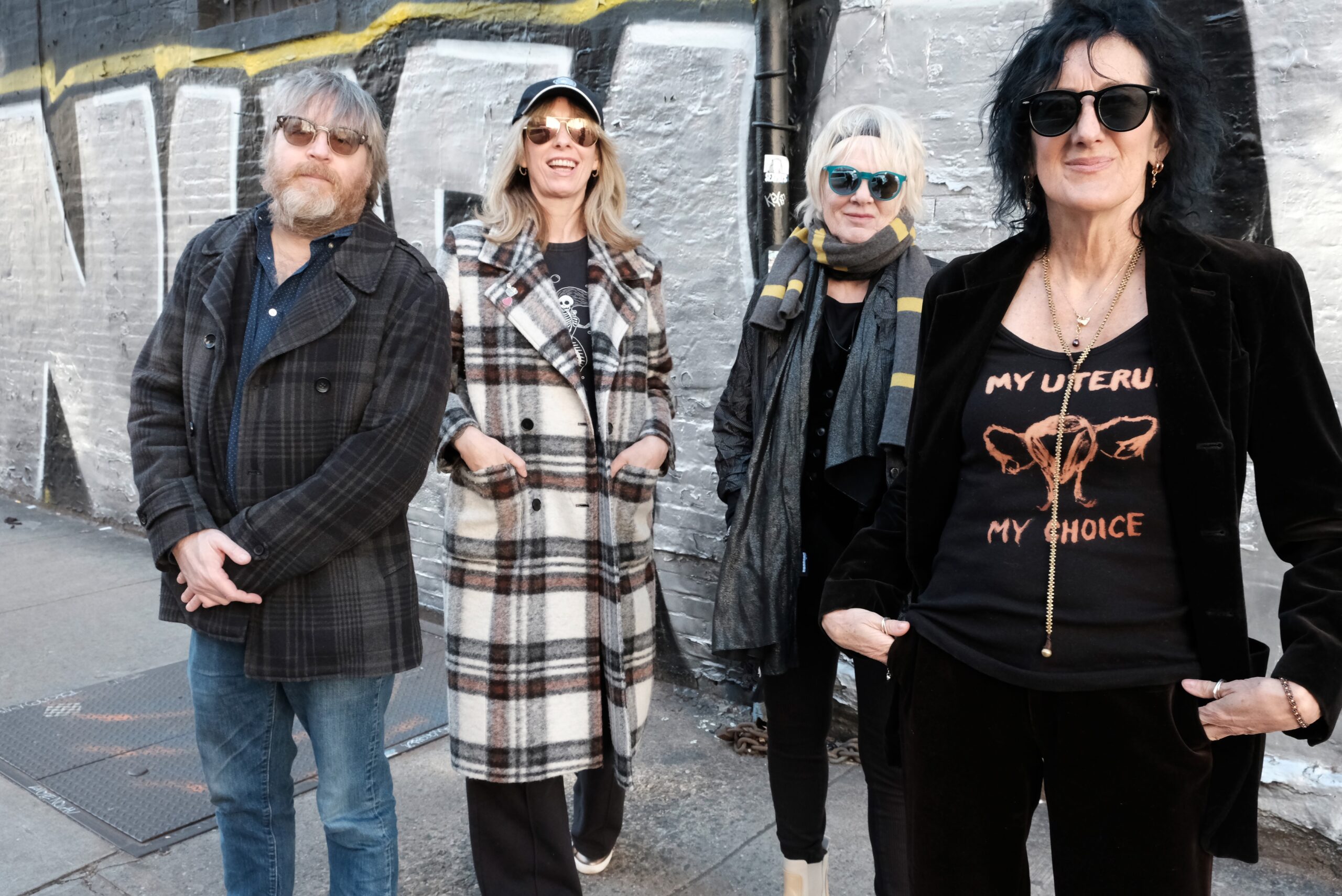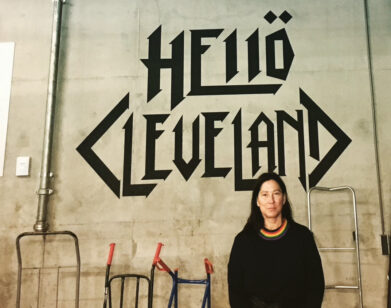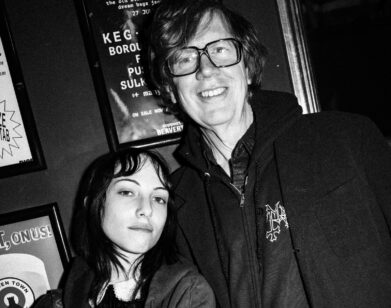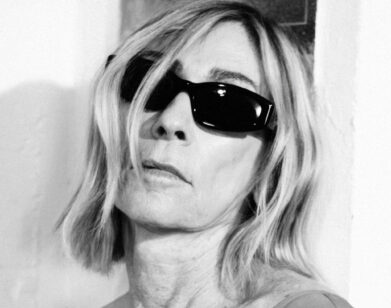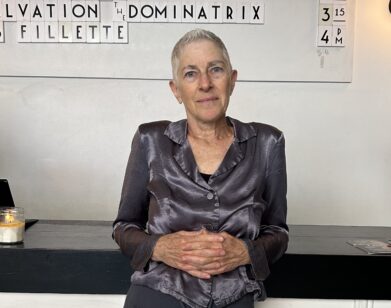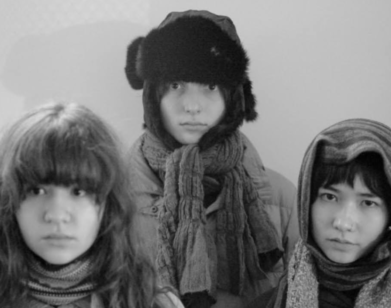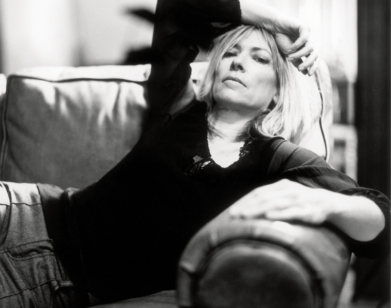NOSTALGIA
Thurston Moore and Bush Tetras Look Back on the No Wave Scene
In the late 70s in New York City, while couch-surfing on South Street, Sonic Youth’s Thurston Moore stumbled upon the hottest No Wave band downtown. The newly formed group Bush Tetras had the Manhattan club scene in a trance with the innovative slide guitar and fingering skills of Pat Place and the intoxicating vocals of Cynthia Sley. “You guys were the coolest band all of a sudden,” Moore told Place and Sley over Zoom last week. “Just like, boom.” His admiration would morph into a decades-long friendship between the two bands, culminating now in Sonic Youth drummer Steven Shelley’s work on the new Bush Tetras album, They Live in My Head. Shortly after the release of their record, Moore called up Sley and Place to stroll down a memory lane of rock and roll beefs, the birth and death of No Wave, and what it’s like to make music 40 years after they both burst on the scene, with “nothing to lose.”—ARY RUSSELL
———
THURSTON MOORE: What’s happening?
CYNTHIA SLEY: Hi. How are you doing? You feel a little rested?
MOORE: Yeah, I’m okay. We’ve been on the road off and on for the last couple of weeks. Before that, we were in the States kind of getting it back together. Eva [Prinz] and I are leaving tomorrow for another week, but with a gig at the end of it.
SLEY: Did you have a good birthday?
MOORE: Yeah. I mean, we played the night before at Waylon’s, which you guys are going to be at in November. That’s like the place in Dublin. I don’t know if you ever played there.
PAT PLACE: No.
MOORE: I haven’t been there in years, but it is super cool. The people there are really friendly and nice. It’s the prototypical Dublin pub and that’s where everybody plays. You’ll dig it. We played there and the next day was my birthday and we just bummed around, Ev and I.
SLEY: I really love Ireland.
MOORE: It tends to rain a lot, so we kind of lucked out. So yeah, and then we’ve just been kind of recuperating and that’s about it.
SLEY: Was it a long tour?
MOORE: It was not super long, but we’ve sort of been going out every other month, doing 10 shows in Germany or something, and it’s a little sort of sporadic. It’s easy for us, being only a couple hours away from these countries, so we can pop in and set up some dates. A lot of it is making up for all the touring we wanted to do in 2021 and 2021. We haven’t done the USA only because everybody except for myself is from the UK and it’s really expensive to get visas and stuff.
PLACE: Oh yeah.
SLEY: And you’ve got to promote your book [Sonic Life].
MOORE: That’s coming up very soon. You guys are in it. There’s some Bush Tetras action.
PLACE: Oh, yeah?
MOORE: Of course. I mean, it’s not like a dedicated chapter or anything, but there is a bunch of action.
SLEY: What do you mean it’s not a dedicated chapter?
MOORE: Well, there very well could be. When I delivered my manuscript, I wrote too much. And I had so much downtime during the pandemic and I was really concerned about having enough content, so I just wrote everything. And then the editors were like, “It’s 10 times too long.” So all of last year was just editing it down, scissoring and shearing. I give histories of just about every single band that we ever intersected with, and try to talk about anything except for myself.
SLEY: I’m glad you wrote that because you’re a really good writer.
MOORE: Oh, well, thanks. I talk about the first time I saw you guys and how important that was.
SLEY: Where was the first time you saw us? CBGB’s?
MOORE: First time I saw the Bush Tetras would’ve been right when I first started hearing about you guys. You guys seem to be graffitiing your names around downtown before you even played. Am I right about that?
PLACE: Yeah.
MOORE: We knew that there was this band. For us, it was like Pat was in a new band after Contortions and that was really exciting. And I didn’t know you, Cynthia, at all. I didn’t know Dee [Pop] at all either, and I didn’t know Laura [Kennedy]. It was all about, like, Pat has a new band and it’s three women and it was phenomenal. You guys were the coolest band all of a sudden, just like boom. And it was a sensation.
SLEY: It was a spectacle. I remember seeing you, Thurston, because I was living in that space for part of the time in 1980 and you were always somehow out there. I remember seeing you and thinking, “Who’s this kid? He’s got to be like 12 years old.”
MOORE: I was just prowling around. I didn’t have money or anything and I would hear stuff coming out of that building. I was really into what you guys and 8 Eyed Spy were up to. It was so intimate. It was so close. Even though I wasn’t really friendly with a lot of you guys at all. That really came when I met Lydia [Lunch] and she introduced me to everybody. All of a sudden there was a weird connection because I was already involved with people around The Kitchen, like Glenn Branca and Rhys Chatham and that kind of the Soho No Wave, as opposed to the East Village No Wave. So I became kind of this bridge in a way. There was a lot of sideways side eyes between the two communities.
PLACE: There were. I came from an art background, but I was in The Contortions so of course I was put on that side of things.
MOORE: The Contortions ruled the roost. I remember seeing one of your shows of your plastic dinosaur photographs and things like this.
PLACE: Oh, at Artist Space probably.
MOORE: You kind of crossed over and that was cool.
PLACE: Yeah. “What’s she doing in that band?”
MOORE: You transcended everything. It wasn’t some big war or anything like that, but it definitely was a kind of aesthetic headbutt going on in the streets.
PLACE: And it’s funny because Contortions played Max’s Kansas City a lot and it was filled with downtown art people. And that’s when James [Chance, of The Contortions] started getting in fights in the audience.
SLEY: Yeah, I remember that.
MOORE: And audiences did not take sides. The musicians were kind of being loud-mouths about it in a way. [Glenn] Branca took it kind of seriously and it was a bit of an affront. I started playing with Lydia and that was really weird for Glenn, like, “Oh you’re with the enemy.” And then I remember I kind of brought the two of them together and you could really feel it in the room. He was just sort of like, “Hi, Lydia.” And she was like, “Hi, Glenn,” and just bashed into him as she passed him, the way she would.
PLACE: I can picture that really well.
MOORE: Yeah. In some ways, I was trying to make peace between these two countries.
PLACE: Yeah. I mean, you can’t take any of that too seriously, right?
MOORE: I think with Bush Tetras and even 8 Eyed Spy, it didn’t have that kind of allegiance to anything. You guys were just new. We always looked at it like, “Oh wait, people coming out of No Wave are actually playing more sort of traditional tropes of music and rhythm and things like this,” and that was really exciting. Because your slide guitar playing in The Contortions was so radical. You would do this one move and it would just completely make everything work. There was nothing more radical going on with guitar playing at that time. It was just like, ‘Where did that come from?” When the Bush Tetras started, you were still employing that, but then all of a sudden you were doing some fingering things, too, and that was really fascinating to hear. If I remember correctly, you had a phase shifter that you used.
PLACE: Yeah, for phase shifting. And made up chords. I tried to veer away from bar chords. I mean, I knew of the bar chord. I learned the ninth funk chord from Jody [Harris]. But you know, The Contortions definitely took No Wave and gave it a beat. It’s funny because in all these reviews we’re getting now, everyone’s like “No Wave pioneer,” or they keep pigeonholing us as a No Wave band, which we really were not. No Wave was over by the time Bush Tetras started, really. I think we were trying to be more accessible and danceable.
MOORE: As soon as there was any semblance of accessibility, No Wave died.
PLACE: Yes, exactly. Because that’s what it was about. But that’s why also it was kind of short-lived because, I mean, how much of that can anyone listen to, really? I think Lydia’s idea was just to completely tear and deconstruct any sort of rock and roll, including punk. It was taking punk to the next step. “Okay, this is going to be basically unlistenable. We’re going to have 30-second songs.” Yeah. So coming out of that, I would make up chords because I was the only guitar player and I didn’t want to just play slide.
MOORE: In some ways it took No Wave and just blew it out into the world. You were almost dripping with nihilism, but it was also really beautiful. There was this real sort of ferocious glamor to it. And then Laura [Kennedy], when she would play bass, every once in a while she would do that jump. You know what I’m talking about?
SLEY: Yeah, yeah, yeah, yeah.
PLACE: Which was not allowed in the No Wave bands.
MOORE: The first time I saw her jump was at the Mudd Club, and I remember standing there and she’d jumped into the air and did this rock and roll move. That’s like breaking the boundaries. It was the coolest thing in the world. I was just like, “Oh yeah, that was totally badass.”
SLEY: I used to love the way she prowled around on stage.
MOORE: She was mesmerizing.
PLACE: Cynthia and I were more shy. I would often play with my back turned away from the audience. Not to be rude, but because it was just too much looking at all those people staring at me.
MOORE: The fact that your back was to the audience was the coolest thing in the world because it was like, you didn’t necessitate the acceptance. It was just like, “I’m playing with this band. Like it, lump it, or leave. I don’t care.”
PLACE: Cynthia was kind of shy in the beginning too.
SLEY: Yeah, but I was really nearsighted, so I couldn’t really see the people. That was an advantage.
MOORE: Cynthia, I was reading something and you were in this book. It’s the book by Darryl Pinckney, his memoir about Elizabeth Hardwick.
SLEY: Yeah, it’s so good, isn’t it? Oh my god.
PLACE: What’s the name of the Darryl book?
MOORE: It’s called Come Back in September. He talks about going to see Bush Tetras. And it’s Darryl Pinckney’s memoir of being a personal assistant to Elizabeth Hardwick, the woman who was the great essayist up at Columbia and English literature professor. She created the New York Review of Books. She’s super, super important in New York letters. And she was part of this gang of her and Susan Sontag and other women writers who would gather uptown and have a symposium. And Darryl was one of her assistants and they would have these great discussions. So he writes about it in memoir fashion, but it’s really loosey goosey. It’s almost as if he kept notes the entire time. Anyway, you appear in it because he wants to see Cynthia’s new band.
PLACE: What year did you come to New York?
MOORE: I first came in late ’76 and I lived an hour away, so I just kept coming back and forth, and then I met some people and I was couch surfing all through ’78 down on South Street. You know that building on South Street that everybody kind of lived in?
PLACE: I came in ’75, but I started hanging out at CB’s in ’76 and saw the whole punk thing and turn into No Wave.
MOORE: I didn’t really get my own place until I think the spring of ’79. I found a place on 13th and B.
SLEY: That lovely neighborhood.
PLACE: Great location.
MOORE: Oh, yeah. I’ve got to plug my computer in. The battery is dying, hold on.
SLEY: Thurston, do you know that book Dino about Dean Martin?
MOORE: Dino by Nick Tosches? Yes. I never read it.
SLEY: Oh, it’s so good. I’m finishing it.
MOORE: Oh, cool.
SLEY: I think we better talk about the record maybe.
MOORE: Yeah, there’s this new record. The new record is you two OG BTs with this drummer dude that you found in the streets of Hoboken.
PLACE: I know. You don’t possibly know him.
MOORE: He’s pretty good. I heard good things about him.
SLEY: Yeah, he’s pretty good.
MOORE: He was so excited. Cynthia, you wrote to me. It was like, “Do you think Steve Shelley would be responsive?” And I was like, “I think he would.” He really loves you guys. I gave you his email and then he immediately called me and said, “Did you give Bush Tetras my information?” I was like, “Yeah, Cynthia was asking about you and I thought it would be really cool.” And he was just like, “Wow, I don’t know if I can be that good.” He loved your music, so I think he was really nervous, but he certainly accepted the challenge. I’m glad it worked out.
PLACE: It worked out so well. It was like a lost puzzle piece. Just totally fit right in.
SLEY: And he is very lovable.
MOORE: Yeah. No, we love Steve.
SLEY: Sonic Youth is a lot like Bush Tetras in that way. You’re team players, you work together, everything’s split four ways. You write, you jam, things come out in little kernels. He fit right in with that. That was important.
MOORE: He was really excited. And then when you guys did some session work at Martin Bisi’s [a recording studio in Gowanus founded by Martin Bisi] he was really excited. We hadn’t been there since ’85 or ’86. He was like, “Guess where I’m going? Back to Martin Bisi’s.”
SLEY: Yeah, I know. I took a good picture of the two of them together.
MOORE: The record’s really good. I’ve only heard it once all the way through, but it was really interesting because the dynamics of the songwriting, the title song is this really dark, loping kind of piece. And then there’s a really sort of ferocious… it sounds like you’re playing four guitars at once, kind of. And it really struck me. It sounds so contemporary. It doesn’t sound like you’re kind of pretending to be Bush Tetras in the ’80s, ’90s.
SLEY: Well, that’s good.
PLACE: We’re glad that came through because we’ve gotten a lot of great reviews, but also some people are saying, “Well, it doesn’t sound like the old stuff.” Well, yeah, it’s 40 years later.
MOORE: It is 40, yeah. To hear Steve in the context of you guys and your bass player as well, RB Korbet. It’s a new vibe. It’s not trying to replicate what was going on with Dee [Pop] and your other bass players.
PLACE: We started some of the songs with Dee and then we wrote a few with RB. And then when Steve came in, it made all of those gel. And so “Walking Out The Door” and “The End,” our songs that we really just wrote with Steve, it took us off in this other direction that we really are enjoying. It’s more spontaneous.
MOORE: Right. The vibe of the record was that nothing sounded like it had to be done. It just sounded really natural in a way that I don’t really hear on too many records these days. I always feel like there’s some other agenda when I listen to people’s recordings sometimes, almost like it’s part of the job or something. This didn’t sound like that.
SLEY: Yeah, that’s the opposite of us.
PLACE: Like trying to be radio-friendly, or something.
SLEY: Pat and I, we just go with whatever chemistry we have and try not to overthink it. Well, you do the same thing.
MOORE: Yeah, there’s never any of that anxiety that existed when you were younger. In some ways it’s like, well, we’ve been through the wars together. And now we can sort of just enjoy playing music and making art and being communal.
PLACE: Nothing to lose.
SLEY: Nothing to lose. That’s exactly it.

